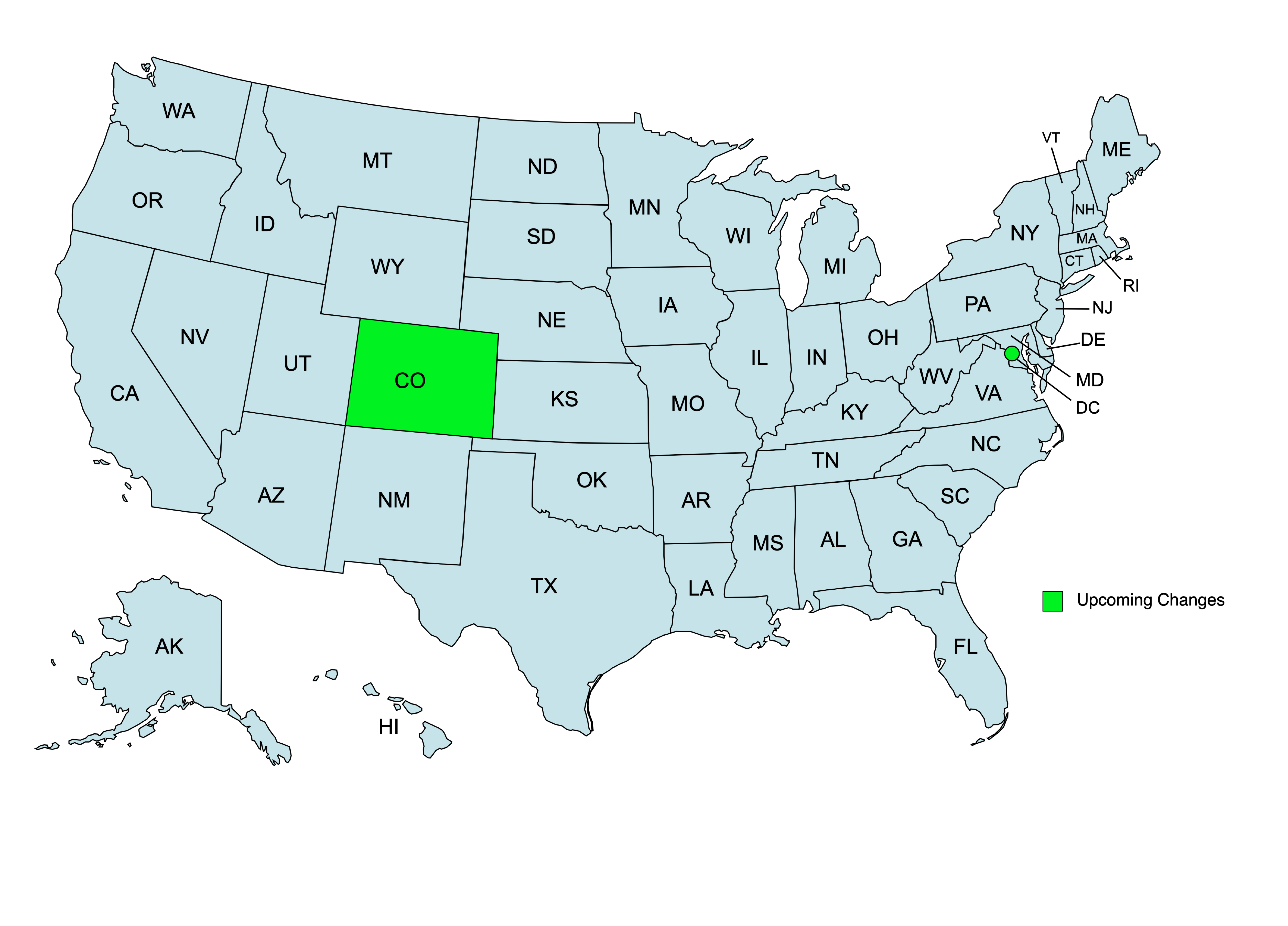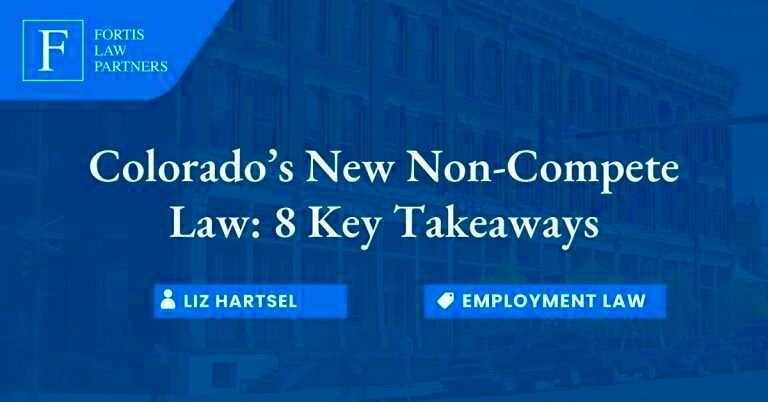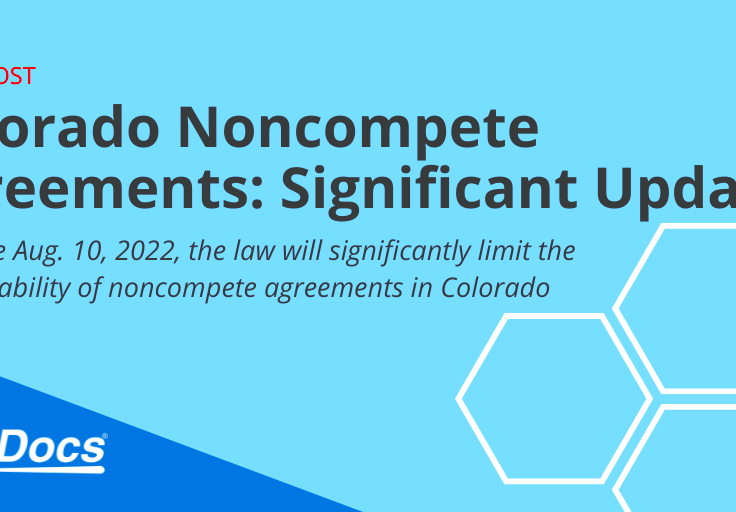What You Should Know About Colorado’s Noncompete Law in 2023
Noncompete agreements can be quite a challenge. It’s that moment when you realize you can’t simply start a job because of some documents you signed previously. Colorado, like many other states, employs noncompete clauses to prevent employees from leaving and joining competitors. However the rules surrounding these agreements have undergone significant changes recently. Noncompetes impact lives and it’s not just about lawyers engaging in discussions; it’s about individuals striving to make a living. I recall a friend of mine who found himself in a situation. He felt trapped, frustrated and perplexed. Grasping the nuances of these agreements is essential especially in Colorado where new laws are bringing more clarity to the matter.
In Colorado noncompete agreements are viewed with skepticism particularly when they hinder individuals from seeking employment. The states stance aims to strike a balance, between the interests of businesses and the rights of workers. If you’ve ever felt constrained by a noncompete you’re not in. Many employees are unaware of the implications of their agreement until it’s too late. Familiarizing yourself with the details of these contracts can help you avoid surprises, when changing jobs.
How Colorado’s 2023 Law Differs from Previous Legislation

The recent update to Colorados noncompete law in 2023 brought a wave of relief to workers. I remember the days when the rules were strict and it seemed like only companies had the advantage. Prior to 2023 it was easier to enforce noncompete agreements leaving employees feeling trapped. However things are shifting now in Colorado.
In the past the laws around who could be tied to a noncompete agreement were pretty vague. This resulted in numerous court battles and a fair bit of confusion. However with the update things have become clearer, especially regarding which employees are safeguarded. Now workers making below a certain income level can no longer be compelled to enter into these restrictive contracts. This is a significant victory for employees. Additionally there is now an emphasis on transparency. Employers are required to explain these clauses in a way that is understandable to the public rather than just legal professionals.
I view this change as a good thing. It helps to make things fairer and gives hope to those who have felt helpless before. It’s a move towards progress.
Key Provisions in Colorado’s Noncompete Law

What really catches my eye in the new Colorado noncompete law are the fairness focused provisions. For instance there’s the income threshold I mentioned before. If your annual earnings fall below a specific amount (which gets adjusted for inflation) you won’t be bound by a noncompete agreement. This is aimed at safeguarding individuals who may lack the means to contest such agreements in court.
Another key aspect is the need for a duration and extent. I find this provision reasonable because it wouldn’t be fair to prohibit someone from working in their field forever! Noncompete clauses should be in terms of their length and coverage. For instance if an agreement attempts to prevent someone from working statewide for a decade it likely won’t hold up according to Colorados regulations.
The emphasis is on being open and honest. Companies now have to give employees a straightforward notice in writing before they sign anything. It should be written in a way that is easy for people to grasp. No more using convoluted jargon to obscure things!
These adjustments provide employees with an opportunity to stand up for themselves and ensure that noncompete clauses aren’t merely used by businesses to prevent individuals from leaving positions they wish to depart from.
What Types of Employees Are Protected by the Law

Its comforting to see that the law in Colorado is making an effort to support individuals. The recent update to the noncompete law provides some relief for employees with lower salaries. Now workers earning less than $60750 a year are protected from being tied down by these agreements, which is significant for those who have limited negotiating power. When I learned about this threshold I immediately thought of my cousin who works in retail. She puts in effort but doesn’t earn that amount and it made me realize how unjust it would be for someone like her to be trapped in a contract.
Its reassuring to witness a move towards equity making sure that those who require the utmost safeguarding are not exposed to binding contracts.
Penalties for Violating Colorado’s Noncompete Law
Breaking Colorado’s noncompete law is serious business. When an employer attempts to enforce a noncompete against someone who is shielded by the law they face more than just a warning. The consequences are significant and aim to deter companies from crossing the line. It goes beyond a penalty; it’s rooted in fairness, which strikes a chord with me.
To start with companies could face penalties if they are caught enforcing noncompete agreements in a way. These penalties can amount to as much as $5,000 for each instance and that’s not an insignificant amount. Additionally employees can take legal action against them for damages potentially leading to even greater costs. I recall coming across a situation where an employer had to pay not fines but also cover the employees legal expenses which likely stung more than the initial breach.
Another point to consider is the matter of contracts. If a noncompete clause is deemed unlawful under Colorados regulations it becomes null and void. Essentially it’s treated as if the agreement never took place. Picture this scenario an employer believing they have secured a crucial employee only to discover that the contract holds no value in a legal setting!
Before pushing for noncompete agreements employers should carefully consider the potential repercussions they may face.
Steps Employers Must Take to Enforce a Noncompete
In Colorado employers can’t just slap a noncompete contract in front of an employee and expect it to be enforceable. There’s a specific procedure they must adhere to and overlooking any steps could jeopardize the agreements validity in court. This aspect of the law safeguards against noncompetes being carelessly imposed on employees which I find reassuring. Individuals have the right to be aware of what they’re committing to.
To start with employers must present the noncompete agreement to the employee using simple and straightforward wording before they take up a position. Its not solely about when it’s given; it’s about ensuring that the employee comprehends what theyre signing up for. No more using convoluted terms that no one can decipher! The law also requires that the agreement is fair regarding its duration and scope. For example an employer cannot prohibit someone from working in an entire state for five years. That’s simply not acceptable.
An important aspect is consideration, which refers to the employee receiving something in exchange for agreeing to the noncompete. This could take the form of a promotion, a salary increase or a new position. If this element is not present the contract cannot be upheld. Employers must also ensure that the terms of the agreement comply with Colorado’s regulations regarding who can be bound by a noncompete. Failing to address this aspect could result in the entire agreement being invalidated.
If employers don’t pay close attention to these procedures they might end up with a noncompete agreement that can’t be enforced and even worse facing some penalties.
How to Challenge an Unfair Noncompete Agreement
Challenging a noncompete agreement can be daunting but it is definitely doable especially if it appears unjust or too limiting. I have witnessed friends getting tangled up in this situation feeling torn between seeking opportunities and fearing the consequences of breaching a contract. The initial step in pushing back is understanding your rights. The updates to Colorado’s noncompete law empower employees more and that is an opportunity worth seizing.
If you think your noncompete agreement is too harsh it’s a good idea to talk to a lawyer who knows about employment law. Often these contracts are worded in a way that makes them unenforceable according to Colorados new regulations. For instance if your salary is below the limit or if the time and location restrictions seem excessive you have a solid argument. Colorado courts are generally not inclined to support noncompete agreements that go beyond reasonable limits.
It’s important to have a conversation with your boss too. I recall a coworker who believed his noncompete clause was foolproof but when he discussed it with his employer they were open to negotiation. In some cases employers use these agreements as a standard practice without considering how enforceable they are. If you approach the situation calmly and seek legal guidance you may be able to negotiate more favorable terms or even eliminate the clause altogether.
Looking at Exceptions and Special Cases
Although noncompete agreements may appear to be a standard limitation there are instances and unique circumstances that alter the guidelines. I find this aspect of the legal system intriguing as it’s not simply a matter of right or wrong. The 2023 law in Colorado specifies particular scenarios in which a noncompete could still be enforceable and being aware of these exceptions can prevent a great deal of hassle in the future.
For example top level executives or employees who handle information may still be subject to a noncompete agreement. The rationale behind this is that these individuals are likely to possess knowledge that could potentially harm their former employer if disclosed to a rival company. Another scenario involves the protection of secrets. If you have access to sensitive business data a noncompete agreement could still be upheld even if your earnings are below a certain level.
There are also some exceptions for doctors. Its interesting to note that while physicians in Colorado can sign noncompete agreements they are still allowed to continue treating their current patients even if they change jobs. This highlights an effort by the law to strike a balance between business considerations and public health priorities. These exceptions serve as a reminder that laws are often nuanced and it’s crucial to explore the details to determine if you belong to one of these unique cases.
FAQs About Colorado’s Noncompete Law
It’s completely normal to be curious about noncompete agreements, particularly given the evolving regulations in Colorado. Here are a few of the frequently asked questions I’ve encountered:
- Who can’t be bound by a noncompete?
If you earn less than $60,750 a year, or are a non-exempt employee, the law protects you from being tied to a noncompete. - How long can a noncompete last?
Typically, the agreement must be reasonable in its duration. Courts tend to reject anything that stretches too far, with one to two years being more commonly accepted. - Are noncompetes valid across all industries?
Not necessarily. Certain professions, like low-wage jobs or some healthcare positions, have specific rules and exemptions that can limit the enforceability of noncompetes. - What happens if I violate a noncompete?
Violating a noncompete can lead to lawsuits, but the burden is on the employer to prove it’s valid under Colorado law. Many times, the noncompete might be void from the start. - Can I negotiate a noncompete?
Yes! In fact, many employers are open to negotiation, especially if the terms seem too restrictive. Having legal advice can help strengthen your position during this process.
These inquiries arise frequently and having a grasp of the responses can assist you in handling noncompete agreements with increased assurance.
Final Thoughts on Colorado’s Noncompete Law
As I think about the changes to Colorados noncompete laws I feel a sense of hope. Witnessing how these agreements can hold employees back in less than situations the recent updates bring a refreshing change. Its akin to being given an opportunity in a game that was previously unfairly biased. The modifications in 2023 tackle some of the longstanding concerns that have bothered workers addressing the income threshold for protecting earners and introducing clearer and more reasonable terms for noncompetes.
I have seen friends and family face challenges with noncompete agreements that appeared to be obstacles rather than safeguards. A friend of mine who was an enthusiastic young professional nearly got sidetracked by a restrictive clause that was not just unjust but also excessively vague. Witnessing the new legislation’s efforts to address these issues gives me hope for a more equitable stance, on employment and competition.
The updated legislation provides support for individuals in need while still respecting the legitimate concerns of businesses. It strikes a balance between fairness and protection of interests which I genuinely value. If you ever find yourself dealing with a non compete agreement keep in mind that these laws are in place to assist you in navigating through the challenges. Stay informed seek guidance if necessary and rest assured that there are safeguards established to ensure you’re not unfairly restricted.


